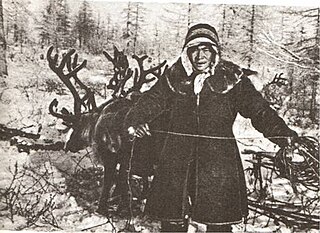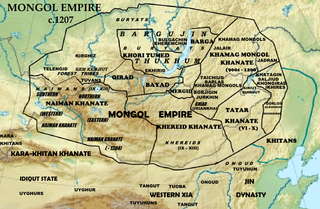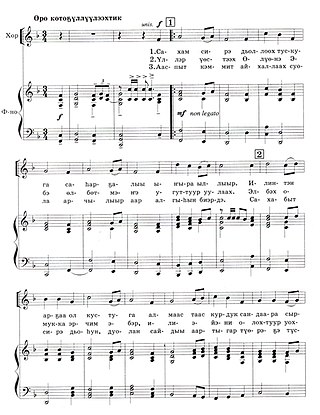
Sakha, officially the Republic of Sakha (Yakutia), is the largest republic of Russia, located in the Russian Far East, along the Arctic Ocean, with a population of one million. Sakha comprises half of the area of its governing Far Eastern Federal District, and is the world's largest country subdivision, covering over 3,083,523 square kilometers (1,190,555 sq mi). Yakutsk, which is the world's coldest major city, is its capital and largest city.

The Yukaghirs, or Yukagirs, are a Siberian ethnic group in the Russian Far East, living in the basin of the Kolyma River.

Yakuts or Sakha are a Turkic ethnic group native to North Siberia, primarily the Republic of Sakha in the Russian Federation, with some extending to the Amur, Magadan, Sakhalin regions, and the Taymyr and Evenk Districts of the Krasnoyarsk region. They speak Yakut, which belongs to the Siberian branch of the Turkic languages.
Yakut or Yakutian may refer to:

Dolgans are an ethnic group who mostly inhabit Krasnoyarsk Krai, Russia. They are descended from several groups, particularly Evenks, one of the Indigenous peoples of the Russian North. Dolgans are the most closely related to the Sakha. They adopted a Turkic language sometime after the 18th century. The 2010 Census counted 7,885 Dolgans. This number includes 5,517 in Taymyrsky Dolgano-Nenetsky District.
Od iyesi is the Turkic and Mongolian spirit or deity of fire. In Turkic languages, Od means fire, and iye is the familiar spirit of any natural asset, literally meaning "master" or "possessor." Od iyesi protects the fire.

The flag of the Republic of Sakha (Yakutia) (Yakut: Саха Өрөспүүбүлүкэтин былааҕа Saqa Öröspüübülüketin Bılaağa; Russian: Флаг Республики Саха (Якутия)), in the Russian Federation, is one of the official symbols of the Sakha Republic, alongside the coat of arms and the national anthem of the Sakha Republic. The flag has four horizontal stripes. From top to bottom, the stripes are light blue (3/4 of the flag's width), white (1/16), red (1/16), and green (1/8). The flag has been used officially as the flag of the Sakha Republic since 14 October 1992. The light blue stripe is charged with a white disc in the center. The diameter of the disc is 2/5 of the flag's width.

Uriankhai, Uriankhan or Uriankhat, is a term of address applied by the Mongols to a group of forest peoples of the North, who include the Turkic-speaking Tuvans and Yakuts, while sometimes it is also applied to the Mongolian-speaking Altai Uriankhai. The Uriankhai included the western forest Uriankhai tribe and the Transbaikal Uriankhai tribe, with the former recorded in Chinese sources as Chinese: 兀良哈; pinyin: Wùliánghā). It is the origin of the Korean term "barbarian", 오랑캐.
Proto-Turkic is the linguistic reconstruction of the common ancestor of the Turkic languages that was spoken by the Proto-Turks before their divergence into the various Turkic peoples. Proto-Turkic separated into Oghur (western) and Common Turkic (eastern) branches. Candidates for the proto-Turkic homeland range from western Central Asia to Manchuria, with most scholars agreeing that it lay in the eastern part of the Central Asian steppe, while one author has postulated that Proto-Turkic originated 2,500 years ago in East Asia.

There are 4 stages in the history of Yakut writing systems:
Olonkho is a series of Yakut heroic epics. The term Olonkho is used to refer to the entire Yakut epic tradition as well as individual epic poems. An ancient oral tradition, it is thought that many of the poems predate the northwards migration of Yakuts in the 14th century, making Olonkho among the oldest epic arts of any Turkic peoples. There are over one hundred recorded Olonkhos, varying in length from a few thousand to tens of thousands of verses, with the most well-known poem Nyurgun Bootur the Swift containing over 36,000 verses.

Yakutyə-KOOT, also known as Yakutian, Sakha, Saqa or Saxa, is a Turkic language belonging to Siberian Turkic branch and spoken by around 450,000 native speakers, primarily the ethnic Yakuts and one of the official languages of Sakha (Yakutia), a federal republic in the Russian Federation.

The state anthem of the Sakha Republic is the regional anthem of the Sakha Republic, a federal subject of Russia. It is one of the official symbols of the Sakha Republic, along with the flag and the coat of arms of the Sakha Republic. It was originally written in the Yakut language by Savva Tarasov and Mikhail Timofeyev. The anthem was translated into Russian by Vladimir Fedorov. The music was composed by Kirill Gerasimov. It was officially adopted on 15 July 2004. The anthem's music is played in F major.

The temir komuz is a Kyrgyz jaw harp, while the komuz is a three-stringed fretless lute. As an instrument, the temir komuz is unrelated to the komuz in terms of style and structure; however, it takes its name from the other popular Turkic instrument.

Indigenous peoples of the Subarctic are the aboriginal peoples who live in the Subarctic regions of the Americas, Asia and Europe, located south of the true Arctic at about 50°N to 70°N latitude. This region includes the interior of Alaska, the Western Subarctic or western Canadian Shield and Mackenzie River drainage area, the Eastern Subarctic or Eastern Canadian Shield, and most of Fennoscandia, Northwestern Russia and Siberia. Peoples of subarctic Siberia and Greenland are included in the subarctic; however, Greenlandic Inuit are usually classified as Indigenous peoples of the Arctic.
The Kurumchi culture or the "Kurumchi blacksmiths" was the earliest Iron Age archaeological culture of Baikalia as proposed by Bernhard Petri. He also speculated that they were the progenitors of the Sakha people, a claim that didn't go unchallenged by his contemporaries. Petri assumed that the Kurumchi left Baikalia for the Middle Lena due to pressure from the ancestors of the Buryats.
The Kurykans were a Turkic Tiele tribe, that inhabited the Lake Baikal area with 6th century Early Kurykans migrated from Yenisey river.

The Dolgan language is a critically endangered Turkic language with 930 speakers, spoken in the Taymyr Peninsula in Russia. The speakers are known as the Dolgans. The word "Dolgan" means 'tribe living on the middle reaches of the river'. This is most likely signifying the geographical location of the Dolgan tribe. Its closest relative is Sakha.









